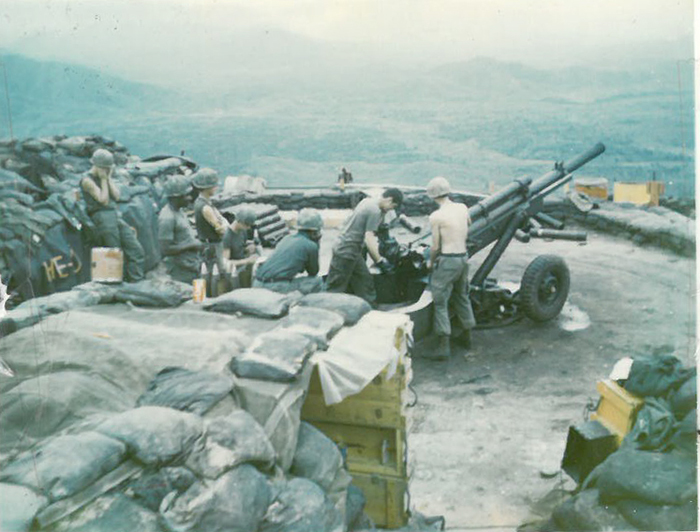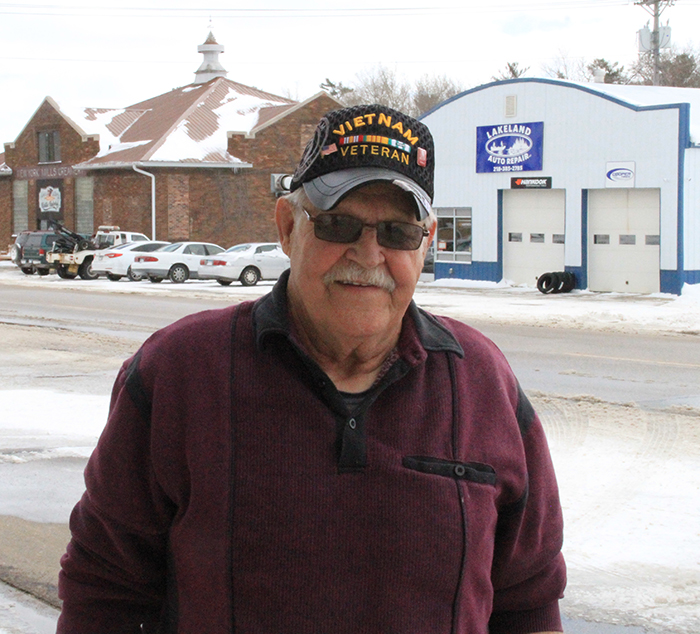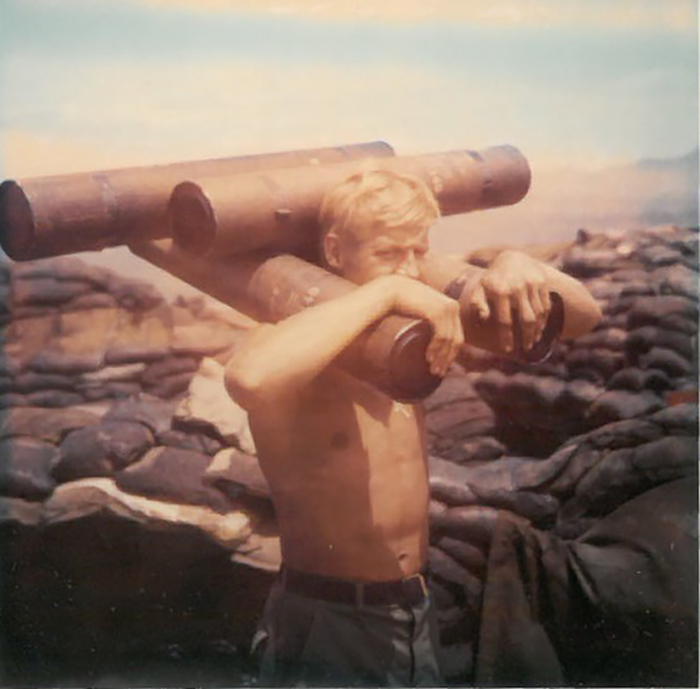Half a century later, NYM man reflects on service during Vietnam War
News | Published on April 2, 2024 at 3:57pm GMT+0000 | Author: Tucker Henderson
0National Vietnam War Veterans Day was May 29

Jerry Anderson served in the artillery division for the United States Army during the Vietnam War. He was a 1968 graduate from New York Mills High School.
By Tucker Henderson
Reporter

As the New York Mills Veteran of Foreign Wars Post 3289 recognized Vietnam veterans on Friday, March 29, they honored over 58,000 servicemen that never made it home from that conflict.
One local man that was fortunate enough to make it back, Jerry Anderson, shared his story with the NY Mills Dispatch about his time in the service of the United States Army during the Vietnam War from August of 1970 to May of 1972.
“I was drafted out of tech school in Wadena,” said Anderson. “I graduated tech school on May 31, 1970 and I got my draft notice on June 1. They used the lottery system back then, so they threw all the birthdays into a hat and drew them out. So I knew where I was going when I graduated.”
Anderson had worked as a field mechanic for Green Giant Corporation prior to attending The Wadena Area Vocational Technical Institute in Wadena. His plans were to return to the company after graduating as an auto mechanic. When his draft notice arrived, however, he knew the United States had other plans for him.

Jerry Anderson served in the artillery division for the United States Army during the Vietnam War. He served from 1970-72 before being discharged.
“The Army changed my mind, they thought it was better for me to go there, so I took basic training at Fort Lewis, Washington,” said Anderson. “That was eight weeks and then I was very fortunate, because I figured I would go infantry being I was drafted, 90 perfect of them did, but I was chose to artillery at Fort Sill, Oklahoma.
“I was at Fort Sill, I’m going to say seven months that I trained before I shipped over to Vietnam,” he continued. “My MOS (Military Occupational Specialty) was 13B40, which is an artillery section chief. I was trained on every artillery weapon that the United States government had.”
Anderson shipped out the third week in August of 1971. Leaving from California, he flew to Alaska to refuel before making a second stop in Okinawa to refuel again and from there, he flew into Bien Hoa Air Force Base in Vietnam. Every soldier’s initial duty was to complete in-country orientation.
“In other words,” explained Anderson, “They get you used to the heat. Then they look at your MOS and see where you’re needed. Me and a buddy from Minneapolis, Jim Gore, we went over there at the same time and we got sent up to Da Nang, that was my home base.”
In Da Nang, Anderson was assigned to the Bravo Battery 3rd/82nd Field Artillery, 196th Infantry Brigade which had 45-50 men tasked with supporting both the 21 Infantry unit as well as the Da Nang Airbase.

Jerry Anderson is pictured with his Howitzer shells during the Vietnam War.
“I was on a 105 Howitzer with a firing capability of a 50 pound projectile up to seven miles with pinpoint accuracy,” he said. “The infantry unit in the bush that we supported would be out for 20-25 days and when they moved, then we always had to be in range of them, otherwise we transferred to power, and the Da Nang Airbase was our sole support. If they hit that airbase, then we had to support them also.”
While the Vietnam War took place between 1955-1975, Anderson remembered eating sea rations that had been packed during the end of World War II.
“When we were out in the bush, we ate sea rations that were packed in 1945 and we got them in ’71 and ’72,” he laughed. “They had chopped eggs and ham, that wasn’t bad. Beef with shrapnel, that was supposed to be beef stew. They give you a pound cake and being that old, it actually weighed a pound I think. The Army even influenced us younger guys to continue smoking because there were four cigarettes in each pack and a book of matches.
“It was a little different, but the food was good,” he continued. “Even as cold as it was, you don’t think it gets cold over there, but when it was about 80 degrees we’d have a flight jacket or a field jacket on at night because our blood was so thin. Then you heat the sea rations with heat tabs and it gets good and hot and you eat them.
“I don’t know that I’d eat a sea ration today, but I survived 10 months on them,” he said.
One of the biggest things that Anderson appreciates from his tour in Vietnam was the camaraderie between soldiers. A Christmas ceasefire is a particular highlight that he remembers from his time in Vietnam. A pallet of beer was flown in to his firebase for the holiday.
“We had 24 hours to drink it up and they came and got the rest,” he laughed. “We went Christmas caroling on Christmas Eve around the firebase. There’s six guns in our battery and we went to each parapet, the guys would join in, we Christmas caroled for about four hours. It was neat.”
Part of the camaraderie was having each other’s backs and looking out for one another.
“You always had a buddy, and that buddy was closer than a brother, and it didn’t make any difference what color skin he was, it didn’t make any difference to us. They were comrades and our job was to fill out our tour over there whether it be 10 months, a year, and come back to the world,” he said.
“That was another point,” he continued. “The guys over there, most of them were crazy or half-crazy. Your mentality, you knew your job and you did your job, but a dust-off pilot, that’s the guy that flys the helicopter and comes in and gets the wounded at any cost. He will fly in there to get a wounded soldier out, we were very fortunate to have them.”
Another good memory was the Bob Hope Christmas Show, where 5,000 men sat and watched Bob Hope, Vida Blue, who was rookie of the year for the Los Angeles Dodgers that year, the Hollywood Deb Stars, and Jim Neighbors, who at that time was one of Anderson’s heroes, all performed for them.
“I got to see that from the Da Nang Airbase on Freedom Hill,” said Anderson. “We sat on a hill in pouring rain and watched Bob Hope and he was tremendous. He did a tremendous uplift for the troops there.
“Then you have to remember, you’re there three and a half hours and then you go back into a combat situation again,” he continued. “So any reliefs that you had, then you go back on alert again.”
Anderson was able to take an in-country R&R (rest and recuperation) while in Vietnam, but wasn’t able to return home during his time there.
“You miss so much,” he said. “My grandmother died when I was over there and I couldn’t even come to my grandma’s funeral because it wasn’t immediate family. I lived with them for about six summers out in South Dakota when I worked for a farmer there.”
Anderson said that he became a Christian early on in his life and that was one part of home that he particularly missed.
“I cried a lot. I missed home, I missed the family. I missed the fellowship in the church, I was going to Apostolic then already. I had accepted the Lord at a young age, but I really led the wild life for about seven years.”
Jerry Anderson about his time at war
Working in a forward fire area, Anderson remembers that they fired 266 days while he was on the firebase, constantly watching for danger.
“You’re always on alert,” he said. “We had guard duty 24/7, we had fougasse on all four corners of the fire base and we had beehive rounds for the weapon.”
A beehive round, Anderson explained, was a 50 pound projectile that has around 2,500 steel flechettes (steel projectiles). It had a 100 percent chance of killing anything 50 meters on either side and 50 meters straight out. He noted that it was only to be used if the weapon was being overrun by the Viet Cong.
“The Vietnamese would crawl through concertina wire, they were good at it, so what we did was hang beer cans and put something inside the empty can so it rattled and you hung them all around the firebase and if somebody’d hit that wire, then they’d rattle,” he said. “That’s why if you see a veteran today and you notice that he sits with his back against the wall. He makes sure he can see all the doors that come in and go out.”
Anderson had been on three different firebases in Vietnam and he noted that they were 700-800 feet in elevation from the jungle floor on a mountain top.
“When you get hit on a firebase you have no place to run,” said Anderson. “When we got hit with 122 millimeter rockets that came in, they do whistle, let me tell you.
“I can tell you, there isn’t an atheist in a foxhole. There isn’t,” he said. “They’re all praying that, if there is a God, help us, save us! They’re just kids. The thing that sticks out in my mind very vividly, is whether it be an Army veteran or a Marine or Air Force, when they’re injured, you know they’re a boy yet, because the first thing they ask for is their mother, they want a hug from their mother, she’ll make it all better.
“I think back to the fact that, when you’re young like that, you think you can do anything,” he continued. “Fifty two years ago, we could have done anything, we weren’t worried about it. ‘Spray that stuff, we don’t care,’” he said about Agent Orange, the tactical herbicide used by the U.S. military to control the thick vegetation of Vietnam. “That’s how we thought. We were there to kick somebody’s rear end and it didn’t work. That war was political, big time. There’s 58,000 names on a wall in Washington D.C. that will attest to that. My unit, there’s three guys on that wall, and they shouldn’t be.”
When Anderson finally completed his tour, he and 550 others flew out of the Da Nang airport on their way back to the United States on the Flying Tigers airline.
“When we left Da Nang and the pilot took off, nobody said a word as he lifted off from the Da Nang airport, nobody. But a half hour later, when he said ‘we have now cleared Vietnam airspace,’ then the plane went wild. We knew we stood a chance of making it back to the world.”
Anderson about leaving Vietnam
The flight landed in Yokota Air Force Base in Japan to be refueled. Then they embarked on a 20-hour flight to the United States, refueling in the air twice. When they touched down at the Oakland Army Base in California, the nightmare of war was over, but their reception would be yet another obstacle they would have to overcome.
“When we landed in Oakland Army Base, the Military Police were there and they welcomed us home and said ‘you aren’t going to believe this,’ and it was very true,” he said. “There were kids that spit on us, they called us baby killers, drug addicts, alcoholics, but never thanked us.
“I still have hard feelings, the thousands of young men that went to Canada to avoid going to Vietnam and I don’t know the exact number, but there’s 58,000 guys that should have came back from Vietnam and didn’t and yet, Jimmy Carter pardoned all those traitors and let them come back to the United States. That’s not right,” said Anderson. “I feel that if you’re gonna live here, you should be able to defend our country. I’m very proud of what I did.”
Anderson has suffered greatly over the years from the after effects of war. He has had to learn to live with PTSD, as well as prostate cancer and neuropathy from Agent Orange.
“I’m 100 percent disabled,” he said. “I’ve had cancer, I’m losing the feeling in my feet and in my hands. I attend PTSD meetings twice a month in Fergus Falls. They are helping, but it’s a long struggle.
“I wake up at night, I’ve woke up once seeing a Vietnamese with a bayonet coming at me,” he continued. “It’ll never leave. I’ve prayed to God, take it from me, Heavenly Father, but the old man is just grinding on it. I appreciate all the prayers.”
Anderson said that the world has changed since those days and the way society views veterans has improved.
“We got tomatoes thrown at us, but we have tried to change the attitude of America after 9/11,” he said. “We’re out there supporting any troops that go overseas. When they come back home, like the unit from Detroit Lakes that came back, we had about 15 guys standing out at the entryway to the VFW in uniform and with the colors, welcoming them home. I tell every veteran I see, ‘thank you and I’m glad you made it back.’”
After returning home and returning to an old life that he no longer fit the mold of, Anderson joined the local VFW Post 3289 of New York Mills in about 1974.
“I was a continuous member then at that time, paid my dues every year,” he said. “It’s gotta be 50 years we’ve been out there, we built that building out there. I have been up and down every chair, I was commander for four years out there, I’ve been junior and senior vice many times. Now I’m in charge of all the funerals.
“We have one of the best funeral details, we practiced it when we first started and we’ve got it down to a fine art,” he said. “I’d put those guys against anybody. Now, active duty might be better than we are because they can make the 90 degree turn, us old timers can’t do that anymore. Just since I’ve taken over the burial detail, which is about 20 years ago, I’ve done 186 funerals.”
While Anderson has been involved in the VFW, he has heard all the stereotypes of VFW members being alcoholics and wants to quash those rumors and set the story straight.
“We’re not just a bar out there, a lot of people think the VFW is a bunch of veterans and all we do is drink, no we don’t. We donate a ton of money to kids, here to the school district, to the 4-H clubs, you name it, anything to do with kids, we’re happy to support them,” said Anderson. “One year, we paid every activity fee for kids in high school who participated, whether it was football, basketball, one act play, band, you name it, we paid the activity fees for all of them.”
Anderson said that his military record has always stated that he was a recipient of the Bronze Star, but it wasn’t until last year that he actually received it, saying that working through the red tape of government was no easy task. He was also awarded the Vietnamese Campaign Medal, as well as being named the Non-Commissioned Officer of the Week while on tour, with a letter written by General Joseph McDonough making it’s way back to be published in the New York Mills Herald at the time.
While Anderson has weathered the years of after effects of the Vietnam War, as well as the nightmarish conditions he endured while on tour there, there are three sayings that stick out in his mind.
“I am very patriotic today,” he said. “The statement of ‘Freedom is not free,’ is very vivid in my mind yet. You have to remember, we were 19 and 20, 21 year old kids. Another is, ‘Vietnam, the land that God forgot, but I remember, I’ve been there.’”
Finally, Anderson summed up the experience of being a Vietnam veteran with something that he saw on a banner complete with a soldier saluting the veterans leaving Vietnam, returning to a country that largely didn’t want them back.
“When I die, I’ll go to Heaven, because I spent my time in hell,” he said.
